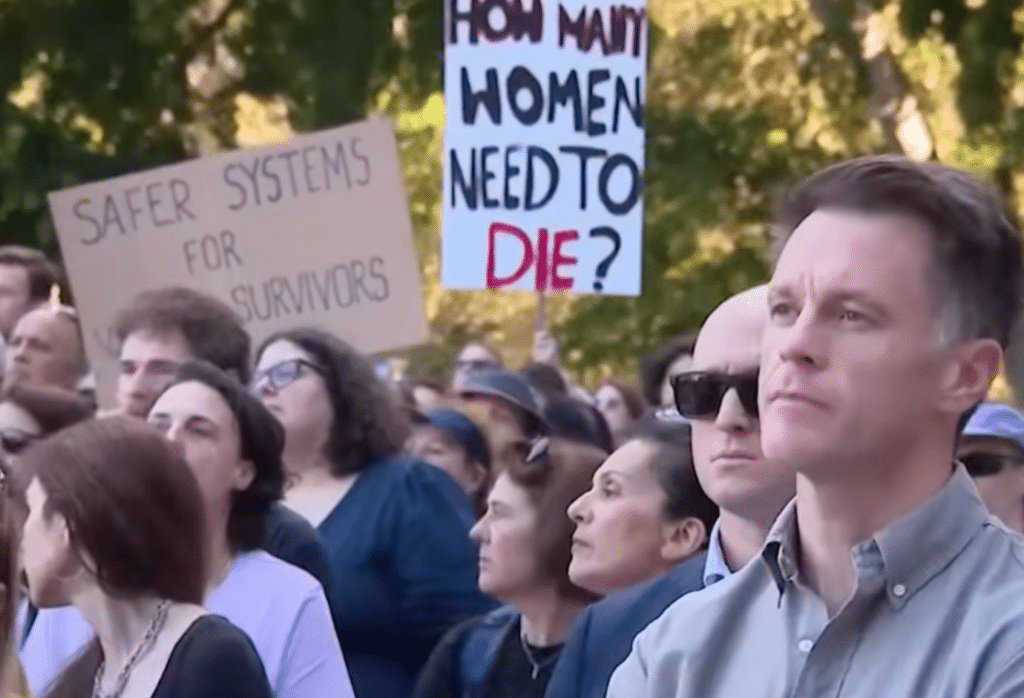The NSW government has pledged $230 million to tackle domestic, family and sexual violence through a range of reforms including specialist staff funding, a primary prevention scheme and a program supporting women and their children to remain safe in their homes after leaving a violent relationship.
The Minns government has announced a range of extra funding for domestic violence support and prevention over the next four years, including $48 million for specialist staff who support children accompanying their mothers to women’s refuges and $24 million towards domestic violence support staff working within the justice system.
Another $50 million will go towards the Staying Home Leaving Violence program, which equips victims with security devices such as CCTV and duress alarms. The funding will also help with their rent, groceries and other amenities.
A further $8.1 million has been set aside for a pilot program to educate young people about healthy relationships, while another $38 million has been committed to developing the state’s first primary prevention strategy to address the causes of domestic, family and sexual violence.
In a statement, Premier Chris Minns said the funding was an acknowledgment that “too many lives have been lost and too many families have been broken because of domestic and family violence”.
“It is a blight in our communities, and it is a problem that deserves our government’s concerted attention and response,” he said. “We cannot accept the status quo.”
“This funding announcement is an important step to doing better, to recognising that domestic violence supports need to be applied not just from a crisis response perspective, but with an eye to disrupting the cycle of domestic and family violence early and permanently.”
The government also plans to undertake further long-term reforms to prevent domestic, sexual and family violence in the state.
The announcement comes less than a week after the federal government announced $925m to help victims of violence leave abusive relationships. Amounting to $185 million a year, the “leaving violence payment” will enable victims to access up to $5000 in financial support to help cover the cost of leaving a relationship in addition to services, risk assessments and safety planning.
NSW Attorney-General Michael Daley said that the state government will confirm the details of a $45 million package to improve bail laws and justice system responses – “ensuring we are reviewing domestic violence supports and systems from every angle.”
“NSW needs a co-ordinated approach across multiple fronts to disrupt domestic violence,” he said. “That is what this suite of funding initiatives is designed to achieve.”
The state’s bail reforms have yet to be announced, as the government is still waiting on the Crown Advocate and the Bail Act Monitoring Group for their reviews into the state’s bail laws. The reviews were ordered after Molly Ticehurst, a 28-year-old mother in Forbes was allegedly killed by her former partner on April 22: her partner was on bail for a separate offence before he contravened an apprehended violence order (AVO).
Over the weekend, NSW Deputy Premier Prue Car said the latest response from the government shouldn’t exclusively focus on emergency and crisis responses. She wants to see long-term solutions for services that address the housing needs of women trying to escape violence — especially in regional areas.
“We will be talking about the medium and long-term action we need to invest in and drive as a government, in terms of, driving the cultural change to stop women from dying and to stop women from being victims of domestic violence, family violence and violence in their intimate relationships,” she said.
The National Legal Aid, an organisation that supports women and children manage family law and apprehended domestic violence orders has called for $317 million each year to address the growing demand for their services.
Domestic Violence NSW noted budget comparisons which revealed that the NSW government spent $200 million less than Victoria on tackling gendered violence.
According to Tanya Whitehouse, the manager at Women’s Domestic Violence Court Advocacy Service, more action is needed.
“The domestic violence sector is, in my experience, a little jaded by talk that we get all the time,” she told SBS last week. “We’ve seen this before when we’ve had other tragedies and we have had good things created.”
“But, there needs to be more and needs to be better. And I think one of the key things is perpetrator accountability, electronic monitoring is one option. It’s going to cost money. Find the money. Stop using it on other things.”


